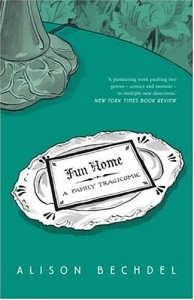 Following the South Carolina House of Representatives vote last week to exact punitive budget cuts from two public colleges that chose LGBT-themed books–including Alison Bechdel’s graphic novel Fun Home–for campus reading programs, we noticed a revealing story that illustrates at least one Representative’s disregard for academic freedom and the voices of students.
Following the South Carolina House of Representatives vote last week to exact punitive budget cuts from two public colleges that chose LGBT-themed books–including Alison Bechdel’s graphic novel Fun Home–for campus reading programs, we noticed a revealing story that illustrates at least one Representative’s disregard for academic freedom and the voices of students.
After the state budget that includes the cuts had passed out of committee but before the full House of Representatives voted on it, the Student Government Association at the College of Charleston unanimously passed a resolution calling on House members to reverse the funding cuts. As a matter of course, the resolution was then forwarded to all House members under the name of SGA Vice President Chris Piedmont. In his accompanying email, Piedmont firmly but respectfully elaborated on the SGA’s position:
Higher education is meant to challenge students to think critically, which often means coming into contact with ideas and beliefs that are different than one’s own. This sparks discussion and ultimately enhances the educational experience of creating well-rounded students who can prosper in a diverse and fast-changing global economy.
But while Piedmont was simply communicating the views of one governing body to another, House member Stephen Goldfinch took it upon himself to respond personally and dismissively. Responding to Piedmont’s email, Goldfinch wrote:
Out of one side of your mouth you demand that we fund your school and many of your educations, yet, out of another side of your mouth, you demand we stay out of your school and your education. I have a simple solution for you: Ask your school to go private. At that point, you can require obscene pornographic mandatory reading without any intervention from the people who fund your school now.
Where to begin with this statement? First of all: yes, most states do recognize that their funding of public colleges does not mean they can dictate curriculum. This principle of academic freedom was established in the 1957 Supreme Court case Sweezy v. New Hampshire, in which Justice Felix Frankfurter wrote that a state institution of higher education has four essential freedoms: “to determine for itself on academic grounds who may teach, what may be taught, how it shall be taught, and who may be admitted to study.”
Next, pornography and obscenity are two different (but sometimes overlapping) things, and Fun Home qualifies as neither. As CofC professor Alison Piepmeier points out in a column for the Charleston City Paper, the book’s legislative opponents “don’t seem to understand that pornography is meant to turn you on, and that’s not what’s happening in Fun Home. The scenes depicting lesbian sexuality are part of a story about the character’s growth into adulthood. They might have realized this if they’d read the book.”
And finally, students were not required to read Fun Home if they didn’t want to. This has been verified numerous times, most recently in a statement from CofC spokesman Michael Robertson:
The College of Charleston has never required students to read the books in the College Reads program. If students were opposed to the book, they were not forced to read it. If the course they were taking required them to read the book, they had the opportunity to drop out of that class and enter another class that did not have that requirement. At no time did the College of Charleston inform students that they were required to read the College Reads book.
Goldfinch’s misconception on this score may be due to his confusion of two different schools. In his email to Piedmont, he went on to claim that “President Pastides testified that students would be tested on the book.” But as Piepmeier notes, Harris Pastides is president of the multi-campus University of South Carolina System, not the much smaller College of Charleston. USC-Upstate, the other school targeted for budget cuts because it assigned Out Loud: The Best of Rainbow Radio to all freshmen, does fall under Pastides’ purview. It’s possible he made a statement in relation to that book, although we can find no mention of it. Seeing as Goldfinch’s wife sits on the College of Charleston Board of Trustees, however, this would be an unusual error for the Representative to make.
After Goldfinch faced public criticism for his unprofessional and misinformed response, he issued a rather defensive apology explaining that he “was irritated and lashed out at [Piedmont]” because “Republicans had been called everything from sexists, to racists, to bigots and homophobes.” Of course, Piedmont had personally called him none of those things and was only stating the College of Charleston SGA’s position on a matter of academic freedom.
According to Charleston TV station ABC News 4, the South Carolina Senate will consider the state budget that includes the cuts to CofC and USC-Upstate “sometime within the next three weeks.” Watch this space for more updates!
We need your help to keep fighting for the right to read! Help support CBLDF’s important First Amendment work by visiting the Rewards Zone, making a donation, or becoming a member of CBLDF!
Contributing Editor Maren Williams is a reference librarian who enjoys free speech and rescue dogs.